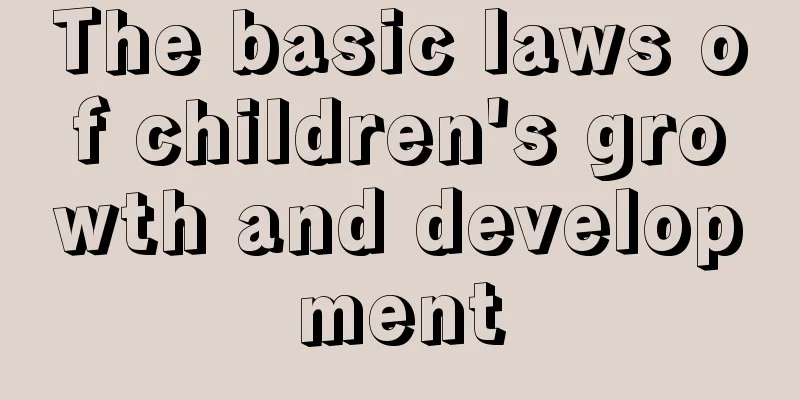The basic laws of children's growth and development

|
Children's growth and development is an issue that parents are very concerned about. Parents all hope that their children can grow and develop normally, but many parents do not know what they can do about their children's growth and development. In fact, parents can understand some basic rules of children's growth and development. Once a child's growth and development does not follow these basic rules, it must be taken seriously. 1. Development is a continuous, staged process The first growth spurt occurs during infancy; the second growth spurt occurs during adolescence. 2. Unbalanced growth and development of various organs The developmental order of the human body's organ systems follows a certain pattern. The nervous system develops early, and the brain develops rapidly in the first two years after birth - the nervous system develops fast at first and then slow; the lymphatic system grows rapidly in childhood, reaches a peak in early adolescence, and then gradually declines (slow-fast-slow); the reproductive system develops late - slow at first and then fast. The development of other systems such as the heart, liver, kidneys, and muscles is basically balanced with physical growth and development. 3. General rules of growth and development Growth and development follow certain rules. For example, motor development follows the rules from top to bottom, from near to far, from coarse to fine, from low to high, and from simple to complex. The pattern of motor development after birth is: lift the head first (2 months), then lift the chest, then sit (6 months), turn over in July, crawl in August; stand in September, walk, jump and run at 123 years old. (Look up in February, sit in June, turn over in July, crawl in August, stand up in September, walk, jump and run at 123 years old.) 4. Individual Differences in Growth and Development Within a certain range, due to the influence of genetics and environment, there are considerable individual differences, and everyone's growth "trajectory" is not exactly the same. In the above article, we introduced an issue that parents attach great importance to, that is, the growth and development of children. We know that children's growth and development follow certain rules. The above article introduces the basic rules of children's growth and development in detail for parents. |
<<: What causes a child's heart rate to be inconsistent with the normal heart rate?
>>: Causes and treatment of acute gastroenteritis in children
Recommend
alert! 12 kinds of food that you should never give to your children no matter how hungry they are!
Children can only thrive under our care and prote...
Two week old baby crying at night
A two-week-old baby is very small, and his physic...
What are the clinical manifestations of Henoch-Schonlein purpura in children?
If a child suffers from allergic purpura, the fir...
Intellectual development of a 4-year-old baby
In life, many mothers are particularly worried ab...
What disease does it cause when a breastfed baby has mucus in his stool?
In life, most babies grow up eating breast milk, ...
What causes a child to have a nosebleed due to a fever?
If parents find that their children have a fever ...
White spots on the child's skin
Children with fair skin are very attractive. Many...
Can babies eat egg yolks when they have a cold?
Everyone knows the nutritional value of eggs. Man...
What are the types of spina bifida in newborns?
Normally, since the organs of newborns are not ye...
Clinical manifestations of gastroenteritis in children
We all know that children's physical resistan...
Can newborn babies use air conditioning in summer?
If the indoor temperature is relatively hot in th...
What to do if your baby starts to wake up while sleeping
Babies are usually frightened when they are sleep...
The reason why newborns have black birthmarks on their faces
We found that many newborns have black birthmarks...
Can my baby drink milk if I have a fever?
Nowadays, many mothers will try their best to fee...
What to do with thalassemia in children
You may not have heard of thalassemia often, but ...









